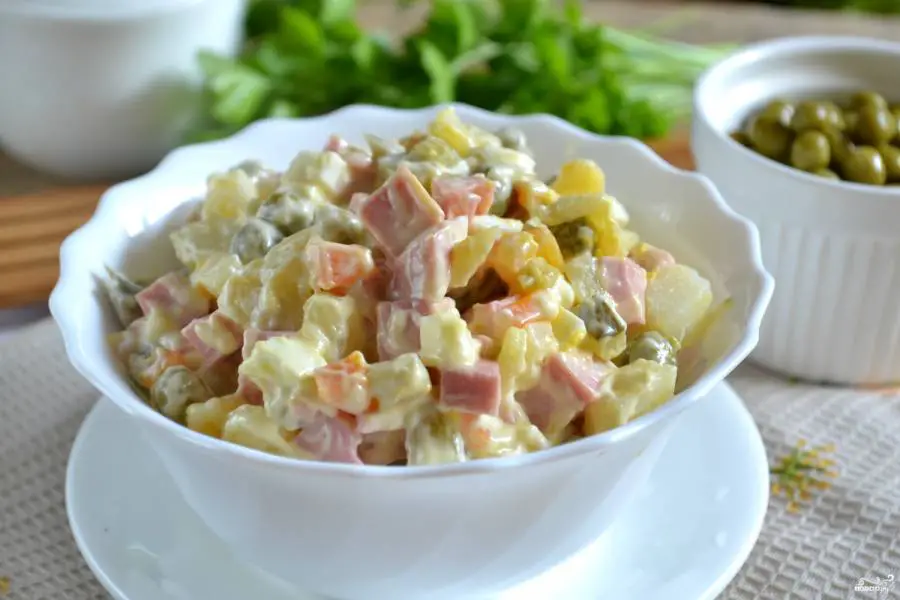Russia’s Olivier Salad (Салат «Оливье») and Latvia’s rasols are well-known staples of their respective cuisines and common additions to holiday tables. Today, the recipes for both are quite similar, with chopped vegetables, egg, and meat dressed with mayonnaise. Olivier is now eaten throughout the former USSR and has even become common as “Russian Salad” in other locations that have adopted it such as Turkey, Iran, and Greece.
Given the similarities between them and Olivier’s much wider geographic spread, rasols is often considered, even by many Latvians, as a Russian import foreign to Latvia. However, both salads actually started out independently as very different from each other and very different from what they are today. Both salads saw their histories and recipes evolve under various foreign influences and converge to a large extent under Soviet influence, but both can be considered separate dishes with their own histories.
Examining these two salads can tell us more about the histories of both countries, of Western food cultures in general, and about the fascinating ways that cultures interact and change over time.
How Olivier and Rasols Got Their Names
According to one legend, Olivier is named “Olivier,” because it was first made for the actor Sir Lawrence Olivier. The legend is absolutely false, but is a good way to remember how to pronounce the salad’s name: Olivier in Russian and English is pronounced the same as the legendary actor’s name.
The original Olivier salad was invented in the 1860s and is named for its creator, chef Lucien Olivier. Of French-Belgian heritage, he ran a Parisian-style restaurant in Moscow called “The Hermitage.” His salad made his elite eatery one of the Russian capital’s most talked about and frequented establishments. For this reason, Olivier carefully guarded the recipe as a trade secret, always preparing it himself. In fact, he took the original recipe to his grave.
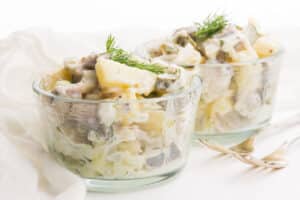
The word “rasols,” meanwhile, is often explained as derived from the Russian “рассол,” (rassol) which refers to brine used for pickling. While the two words appear similar, the connection is unlikely. The salad “rosola” was first recorded in the 17th century by a German doctor, Lentīlijs Rosīns, who traveled extensively in Courland, now part of modern Latvia. That was well before Russian had extensive influence there. Today, various spellings are used in Latvia including rasols, rosols, and rosola.
A much more likely source or “rosola” is from a corruption of “der salat,” from German, meaning “the salad.” Germanic culture had a heavy influence on Latvian culture from the 13th century, when German knights conquered and subsequently ruled what is now modern Latvia for three centuries; Germans remained a ruling class in Latvia for far longer. Over time, the word became “rasols” based on changing pronunciation preferences in Latvian as various tribal languages of the area converged into modern Latvian in the 18th century.
In an interesting twist, however, both the Russian “рассол” and German “salat” actually have roots in the Latin word “sal,” meaning salt. Common Roman citizens referred to salad as “herba salata,” or “salted herb.” “Salata” went on to become the origin of the word “salad” in most European languages, from English to German to Russian.
Rasols: History from 1680-1937
Despite the assumption that rasols is derived from Olivier, rasols is the older of the two by far.
The recipe mentioned above, recorded by Lentīlijs Rosīns (ca. 1680), called for herring, radish, apple, olive oil, salt, vinegar, and pepper to be mixed and then fermented before consumption.
At least by the beginning of the 19th century, there were multiple recipes competing with each other and likely influenced by the European fashion, which enjoyed intense popularity in the 18th and early 19th centuries, of “grand salads.” These always included a broad array of ingredients. They were often served in huge, cornucopic piles in which the challenge was to mix as many flavors, textures, and colors together while keeping the dish harmonious and delicious. Sometimes, “grand salads” were served with individual ingredients laid out in a sort of salad bar from which guests would impress each other by building their own “grand salads.” This tradition often went by the French-inspired term “salamagundy.”
Thus, in 1817, a recipe for “risoll” was published in Katrīna Fēre’s Livland Culinary and Business Book for Large and Small Households. That recipe calls for marinated herring, beets, roast veal, apple, capers, radishes, melons marinated in vinegar, and generous amounts of white onion to be dressed with wine vinegar, salt, pepper, and Provençal oil. Many of the ingredients here are exotic for Latvia and likely only available in relatively wealthy households. Many ingredients, especially the capers and Provençal oil, also indicate French influence.
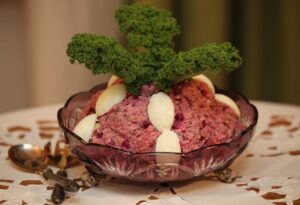
The recipe continued to evolve and change over time. By the later 1800s, for instance, potatoes, introduced to Europe from North America, began to become common ingredients after Tsar Nicholas forced peasants to start growing them extensively. There were regional recipes as well, for instance, with lamprey often featured in Latvia’s coastal areas where they are still regarded as delicacies. There are also recipes from more common households – often replacing the more extravagant ingredients with more common ones like cucumbers, eggs, and dill and dressed not in expensive imported oil, but rather locally produced dairy fats like cream or sour cream.
In 1937, just before Latvia lost its independence to a Soviet invasion, a recipe for rasols was published in The Household Almanac in Riga. This is a relatively modest recipe, one that had most likely been influenced by the shortages of WWI. However, it is a recipe that has lived on in the households of Latvians who immigrated before WWII. This recipe calls for herring, lamprey, eggs, veal roast, potatoes, apples, and pickled cucumbers to be chopped, dressed with sour cream seasoned with mustard, and finally garnished with dill and julienned boiled beets.
Olivier: History from the 1860s-1917
Olivier Salad was originally called «Майонез из дичи» (“Game Bird Mayonnaise”). At that time, any salad dressed with mayonnaise was called a mayonnaise rather than a salad in Russian culture. Likewise, any salad dressed with vinaigrette was called a vinaigrette.
Monsieur Olivier took his original recipe, created in his upscale Moscow restaurant in the 1860s, to his grave. However, we are fortunate to have approximations of that recipe from two sources. One is from an employee named Ivan Ivanov who was once able to sneak a look at Olivier’s work station, noting all the ingredients when the great chef had been called away. He published his recreation in 1894. Another was reverse engineered by one of the restaurant’s regulars who sought a way to keep the salad going after the chef was gone. This version was first published in 1904.
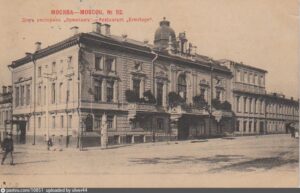
Game Bird Mayonnaise was influenced by the same “grand salad” fashions that had caused rasols, as described above, to evolve in extravagant directions. The original recipe for the “mayonnaise” called for steamed game hen, truffles, smoked duck, black caviar, and capers to be bound in layers of jellied broth, served with a garnish of boiled crayfish tails, pieces of tongue, and a small amount of fresh Provence mayonnaise made from olive oil, egg yolks, French vinegar, mustard, soy sauce, spices, and likely pureed dried fruit and possibly liver pate. Potato skins, gherkins, and sliced boiled egg decorated the dish.
Olivier noticed that most of his Russian customers would take the exquisite layers of luxurious ingredients and immediately mix them together with the sauce and garnishes. They would then eat the mush this created with a spoon. Shocked, but willing to accommodate, the enterprising chef started serving his salad pre-mixed. This is also when the name changed to Olivier Salad, as most of his customers already referred to it as such.
After Olivier died, his restaurant and his salad lived on. Its recipe, like that for rasols, also evolved. Soon, a number of different recipes had been published, all bearing the name “Olivier.” Many were considerably simplified for home preparation. For instance, by 1914, a version had appeared in The Cookbook of Famous Foods, by D. I. Bobrinskago, that had been simplified to just chicken, potatoes, pickles, eggs, lettuce, mayonnaise, and soy sauce – which is quite similar to what the salad would become under the Soviets.
In 1917, as the Communists came to power, most of the staff and owners of the Hermitage left Russia for exile in France. The cafe that had been a symbol of Moscow’s monied and powerful classes closed for good and, interestingly, the name “Olivier” would be dropped from published recipes almost entirely until the fall of the USSR.
Olivier is Dead. Long Live Oliver.
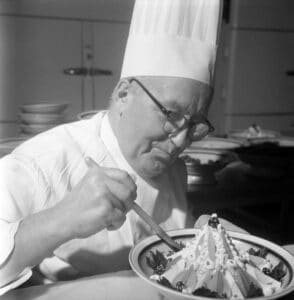
According to one legend, a chef of the prestigious Moscow restaurant, Grigory Yermilin, who had once worked in the Hermitage restaurant in his youth, invented Stolichny (Capital) Salad in 1939. The salad was said to be inspired by Olivier, but Yermilin was working with very limited supplies in his Soviet cafe and thus tried, the legend continues, to recreate the salad mostly in terms of colors. Crayfish were replaced by carrots and capers by canned peas, for instance.
The salad did not appear on the Moscow restaurant’s menu as “Olivier;” that name was associated with bourgeois excesses anathema to the new Soviet reality. However, Yermilin’s rather tongue-in-cheek culinary invention may have been a large contributor to the fact that, under the Soviets, nearly all white, mayonnaise-based salads shifted from being “mayonnaises” and came to be all known as “Olivier.” Thus, foods made exceedingly simple by Soviet shortages and ideology were ironically referred to in private with a luxurious and forbidden name.
The main cookbook of the USSR, The Book of Tasty and Healthy Food, was published 11 times. In only one of these is a salad called “Olivier.” In all other editions, it was referred to as “Game Salad” and featured fried grouse or diced chicken. This was one of the very few times that “Olivier” appeared in print in the USSR.
Olivier and Rasols: Convergent Soviet Influence
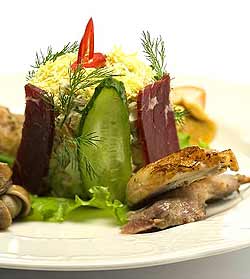
In 1936 and 1959 Anastas Mikoyan, the People’s Commissar of the Food Industry, traveled to the United States. His mission was to learn about how industrialize food production and to purchase equipment with which to do so. Because of these trips, the diets of Soviet citizens greatly changed as many foods became widely available for the first time. These foods included ice cream, popcorn, and hamburger. They also include many ingredients that soon became integral to what we know today as rasols and Olivier.
Many of Mikoyan’s early attempts failed due to WWII arriving to Russia with the Nazi invasion of 1939. Development of the armaments industries was then far prioritized over food. However, by late 60s, pre-packaged mayonnaise, canned peas, and “doctor’s sausage” (the Soviet version of American bologna) were all widely available throughout the USSR. As these were convenient to use and, as other ingredients, such as fresh meat, for instance, could be harder to find, these became staple components in both rasols and Olivier.
The 1950s and 60s also saw a massive influx of Russians to Latvia, especially to urban centers. As the two salads came to increasingly resemble each other and as Russians referred to nearly any white, mayonnaise-based salad as “Olivier,” rasols came to be increasingly known by that moniker, even by Latvians.
Preparing Olivier and Rasols Today
Olivier and rasols can be said to retain some basic differences. Rasols is much more likely to be made with herring, for instance. Rasols will almost always be made with a mix of sour cream and mayonnaise, usually with mustard while Olivier tends to use just mayonnaise, perhaps with mustard. Rasols is more likely to use apple in the mix and to use beets as a garnish.
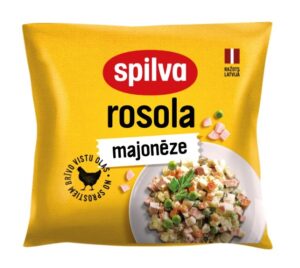
Olivier today, despite being a widely applied term just a few decades ago, has a “classic” version that can be deviated from only so far for many Russians. This version includes potatoes, hard-boiled eggs, peas, pickles and bologna, all in equal amounts, mixed with enough mayonnaise to bind the ingredients well. This version has doctor’s sausage as its main meat. Adding carrots will make the salad stolichnyi salad. Adding carrots and smoked sausage (possibly with cabbage) makes it “Moscow salad.” In fact, many Russians will argue that carrots cannot be added under any circumstances for the dish to remain Olivier. Only a few acceptable additions are available – apple and onion, for instance, are generally accepted.
Most often, any recipe for Olivier Salad that deviates from this short list of ingredients will be termed «Оливье с …» (“Olivier with…”) to indicate what unique element the recipe offers. For example, оливье с курицей would be used to indicate a version with the doctor’s sausage replaced with chicken.
Preparation of Olivier for most Russians is also strictured: all ingredients should be finely cubed into pieces about the size of a pea. Some chefs recommend a return to the use of Provencal sauce, or at least by adding mustard, vinegar, and a little olive oil to the mayonnaise before adding it to the salad.
Rasols is generally more forgiving – both in terms of what ingredients are added (although a meat, potatoes, sour cream, eggs, and mayonnaise are near constants). Generally, rasols also forgives ingredients of different sizes.
When and How to Eat Rasols and Olivier Salad

Both salads can be eaten anytime and are considered by many national comfort foods although, again, for many Latvians, rasols is considered a foreign import and sometimes mocked.
Both salads are also highly associated with holidays and especially New Year’s Eve. Many would be surprised to hear that this tradition really only dates back to the late 1960s in its current form. The position of the dish on the holiday table, however, was already well established when the classic Soviet film Irony of Fate was released in 1976. The male lead is prominently shown eating Olivier. This helped seal its fate as a staple of the holiday table.
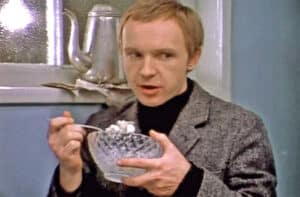
The symbolic meaning of Olivier Salad in Russian cuisine is significant. Much like most Americans could not imagine a Thanksgiving without stuffing, most Russians could not imagine a New Year’s without Olivier Salad. It often shares the table with another holiday staple salad – Herring under a Fur Coat (which, interestingly, resembles the original recipe for rasols).
First Channel, Russia’s most watched television channel, has even capitalized on this by christening its annual New Year’s variety show, which shows animation, songs, and sketch comedy all night, as «Оливье-шоу» (The Olivier Show). This show usually plays without commercial breaks – but with regular plugs for a general sponsor. In the past, this sponsor has most often been, amusingly, a mayonnaise company.
Olivier and Rasols Salad Recipes
These two cultural artifacts have been through turbulent histories. Both are affected by misconceptions that influence how they are currently viewed.
Rasols is a term that is today strongly interlinked with Olivier. In fact, if you google “Rasols,” Google will mix search results for rasols and Olivier, even presenting articles that actually feature only Olivier and not rasols. However, “rasols” is today a much broader term that would apply to many salads that “Olivier” would not. Rasols also has a much longer history, predating Olivier by centuries.
There is also the misconception that both salads, in their current forms, are explicitly Soviet inventions. In fact, as we have seen above, both had recipes very similar to their modern versions before the revolution. While previous recipes were associated with the upper classes, simplified versions were born as their popularity spread to other socioeconomic classes. It is also important to note that both salads are the result of a multitude of foreign influences.
See below for recipes for Russian Olivier and Latvian rasols salads. You might also be interested in the following specialized cookbooks we’ve enjoyed:
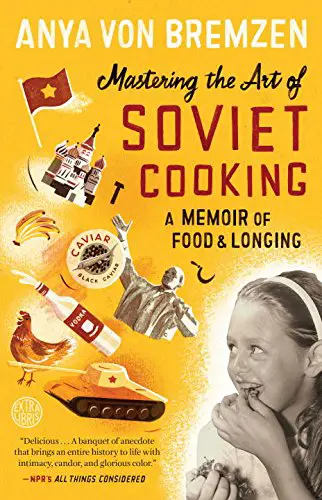 |
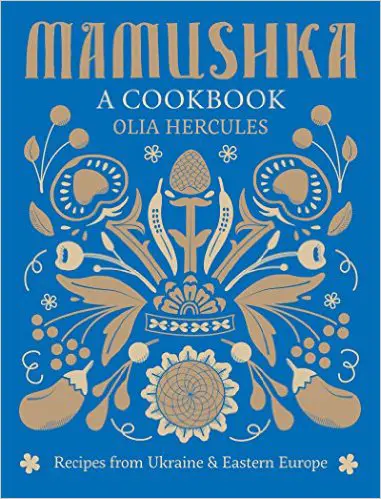 |
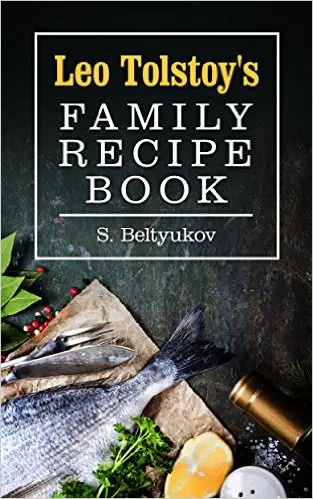 |
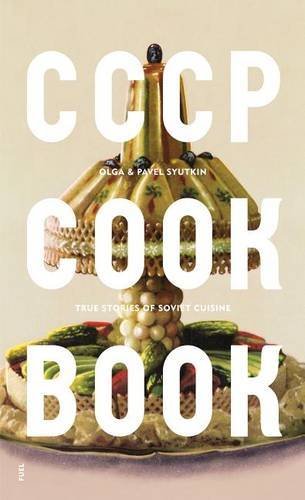 |
Classic Latvian Rasols (recipe from 1937)
Take 1 herring, 3 lampreys, 2 eggs, 200g veal roast, 200g potatoes, 300g apples, 2 salted cucumbers. Debone soaked herring and cut in pieces. Boil potatoes with skin on, then peel and cut. Peel apples and cut. Roast, lamprey, cucumbers and hard boiled eggs also need to be chopped in fine pieces. Mix everything with 400g of sour cream and a touch of of mustard. Boiled beets also suit rasols, but it is better to cut them nicely and use as a garnish on the top of salad. Herbs can also be used as garnish.
| Салат Оливье («советский» вариант) | Olivier Salad (“Soviet” version) |
Ингредиенты
*Все ингредиенты берутся в равных частях Приготовление Ингредиенты нарезать мелкими кубиками. Заправить майонезом. Добавьте по вкусу соль, перец, и свежий укроп, если надо. |
Ingredients
*All ingredients are used in equal amounts Preparation Chop up all the ingredients into small cubes. Mix in mayonnaise. Add fresh dill, salt and pepper to taste, if desired. |
| Салат Оливье («царский» вариант) | Olivier Salad (“Tsarist” version) |
| Вот рецепт «салата Оливье», приготавливаемого в лучшие времена в ресторане Эрмитаж (восстановленный в 1904 году по описаниям одного завсегдатая ресторана):
Ингредиенты
Заправка соусом «Провансаль»: 400 граммов оливкового масла взбитые с двумя свежими яичными желтками, с добавлением французского уксуса и горчицы. Приготовление Ингредиенты нарезать мелкими кубиками. Заправить соусом «Провансаль». |
This early recipe for Olivier salad, prepared during the height of the Hermitage restaurant’s popularity (this recipe was written out in 1904, according to the description of one of the restaurant’s frequent customers):
Ingredients
Provencal Sauce: beat 400 grams of olive oil with two egg yolks until light and smooth, then add French vinegar and mustard. Preparation Chop up all the ingredients into small cubes. Mix in the Provencal Sauce. |
Our Favorite Olivier Clips
This made-for-internet series, known as «Любимые рецепты с Натальей Скворцовой», is apparently done to advertise the mayonnaise brand «Московский Провансаль». Note that the host gives very little direction on how to actually prepare the salad – nearly the entire time is given over to the salad’s history. It is obviously assumed that most Russian-speaking viewers are already familiar with the preparation and likely more interested in a good narrative.
Another recipe for Olivier Salad – from a very calm, Russian-speaking woman who describes the process slowly and clearly.
You Might Also Like
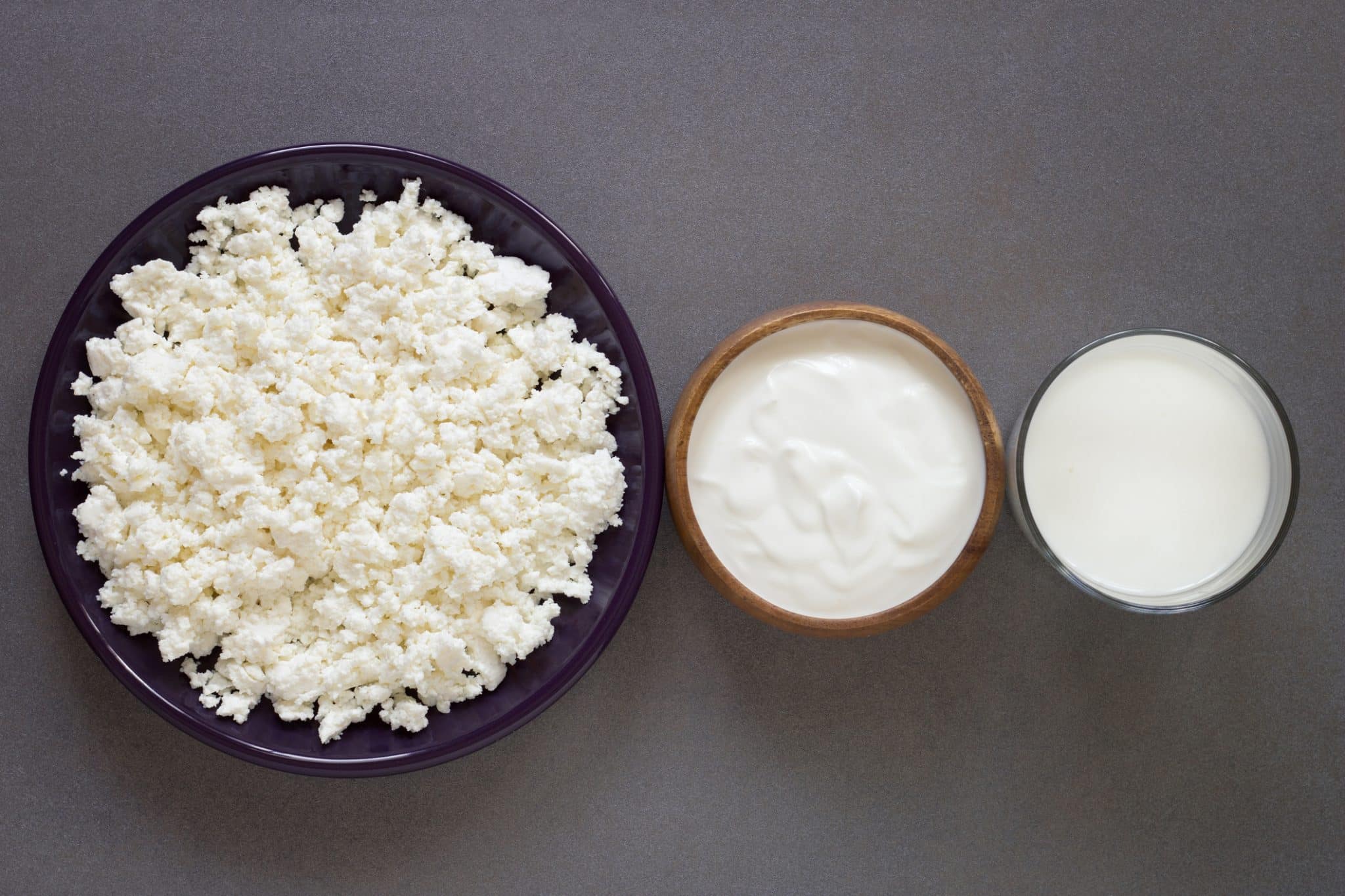
The SRAS Guide to Fermented Milk
Russia and Central Asia offer what can seem to be a bewildering selection of dairy products in their transnational food cultures. An area of special note, and often one of the strangest to Westerners, is the seemingly never-ending assortment of fermented milk drinks and products in the gastronomic repertoire. To cut down on the brow-furrowing […]
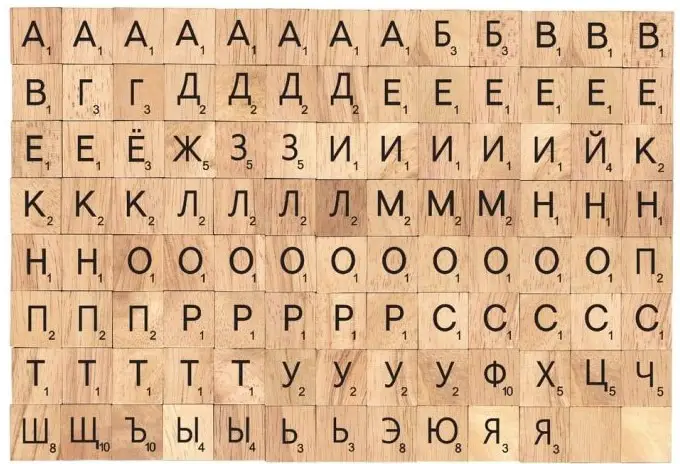
Resources for Students of Russian
This extensive list of web resources to assist students learning the Russian language was developed by SRAS and is now hosted on Folkways, part of the SRAS Family of Sites! Disclosure: Some of the links below are affiliate links. This means that, at zero cost to you, we will earn an affiliate commission if you […]

Kupala: Ancient Slavic Midsummer Mythology and its Modern Celebration
Kupala is an ancient Slavic holiday celebrating the summer solstice, or midsummer. Once part of a series of annual rituals, it marked and was believed to sustain agricultural cycles—essential to early human survival. Held as vitally important, these pagan traditions remained deeply rooted even after Christianization, technological change, and centuries of oppression tried to dislodge […]

Kulich, Paska, Nazuki: The Easter Breads of Eastern Christianity
Easter breads such as kulich, paska, choreg, and nazuki are delicious Easter traditions. Easter is by far the most important religious holiday for those practicing Eastern Christianity. In addition to church services and egg dying, the holiday is also marked across the cultures by ritual bread baking. Despite the wide geographic area covered by Eastern […]
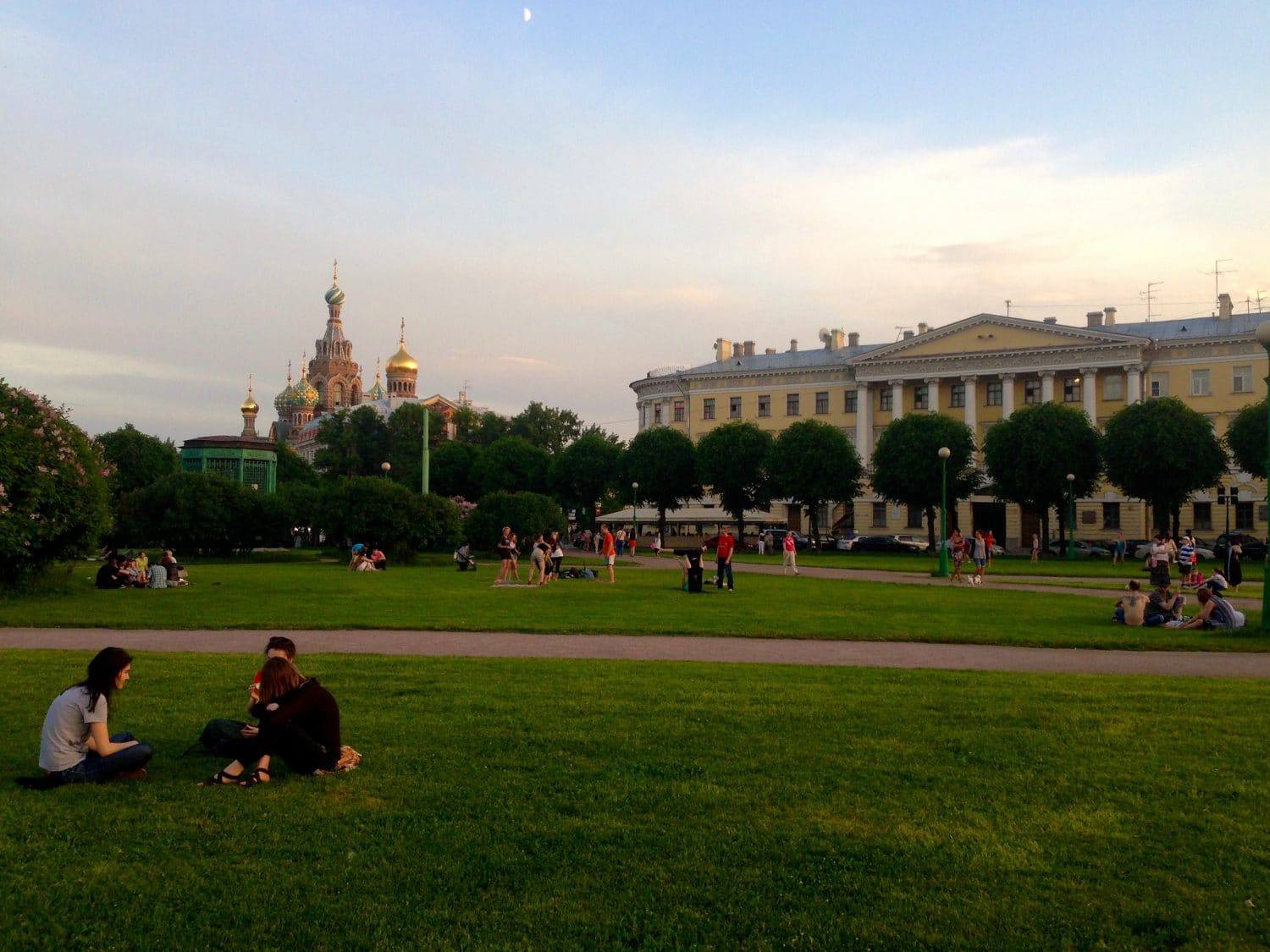
Off to Petersburg, Russia’s Cultural Capital: Моя Россия Blog
Below, Tajik blogger Roxana Burkhanova describes, in Russian, the place of St. Petersburg in Russian culture. She discusses the city’s history as well as its literary heritage, its nightlife, and even how people from Petersburg speak their own, slightly different dialect of Russian. The text was originally written in 2015 and thus references times before […]

